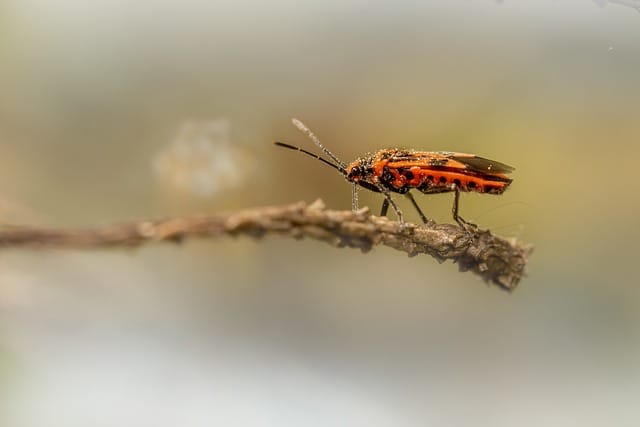Fighting gardening pests: Squash bugs
Squash bugs (Anasa tristis) are common pests that can wreak havoc on your squash plants, including zucchini, pumpkins, and various types of summer and winter squash

In this article:
- Introduction to Squash Bugs
- Identifying Squash Bugs
- Understanding the Lifecycle of Squash Bugs
- Signs and Symptoms of Squash Bug Infestation
- Preventive Measures to Keep Squash Bugs at Bay
- Organic Methods for Controlling Squash Bugs
- Chemical Options for Squash Bug Control
- Companion Planting to Deter Squash Bugs
- Proper Sanitation for Squash Bug Management
- Physical Barriers to Protect Squash Plants
- Time and Temperature Considerations for Controlling Squash Bugs
- Tips for Monitoring and Detecting Squash Bug Infestations
- Integrated Pest Management Strategies for Squash Bugs
- Natural Predators and Beneficial Insects for Squash Bug Control
- Dealing with Severe Squash Bug Infestations
- Common Mistakes to Avoid when Battling Squash Bugs
- Conclusion and Final Thoughts on Squash Bug Control
Introduction to Squash Bugs
Squash bugs (Anasa tristis) are common pests that can wreak havoc on your squash plants, including zucchini, pumpkins, and various types of summer and winter squash. These insects belong to the Hemiptera order and are part of the stink bug family. It is crucial to understand their behavior and lifecycle to effectively control and prevent infestations.
Identifying Squash Bugs
Before devising a plan to manage squash bugs, it is important to be able to identify them accurately. Squash bugs have a distinct appearance with an elongated body and a shield-shaped back. Their color ranges from brownish-gray to dark brown, and their bodies emit a rotten odor when crushed.
Understanding the Lifecycle of Squash Bugs
Knowing the lifecycle of squash bugs is crucial for effective pest control. Understanding their life stages, from eggs to nymphs and adults, helps in targeting each stage with appropriate control measures.
Signs and Symptoms of Squash Bug Infestation
A squash bug infestation can cause significant damage to your plants. Identifying the early signs of infestations, such as wilting leaves, egg clusters, and necrotic spots, is essential for prompt action.
Preventive Measures to Keep Squash Bugs at Bay
Prevention is always better than cure when it comes to pest management. Implementing preventive measures helps minimize the risk of squash bug infestations and reduces the need for aggressive control methods.
Organic Methods for Controlling Squash Bugs
If you prefer organic gardening practices, there are several natural ways to combat squash bugs. From using beneficial nematodes to employing organic sprays, incorporating these methods is safe for both your plants and the environment.
Chemical Options for Squash Bug Control
In situations where organic methods are not sufficient, chemical options can be considered. However, it is important to approach chemical control with caution, following proper application guidelines and considering potential effects on beneficial insects and the surrounding ecosystem.
Companion Planting to Deter Squash Bugs
Companion planting can help deter squash bugs by using pest-repellent plants to protect your squash crops. By strategically selecting compatible companion plants, you can create a natural barrier against these pests.
Proper Sanitation for Squash Bug Management
Maintaining proper sanitation practices in your garden is essential to prevent squash bug infestations. Regularly removing plant debris, cultivating the soil, and rotating your crops can disrupt their lifecycle and reduce their numbers.
Physical Barriers to Protect Squash Plants
Installing physical barriers around your squash plants, such as floating row covers and insect netting, offers a reliable defense against squash bugs. These barriers protect your plants while still allowing air and light to reach them.
Time and Temperature Considerations for Controlling Squash Bugs
Understanding the impact of timing and temperature on squash bug activity is important. By focusing control efforts during their vulnerable stages and adjusting strategies according to temperature conditions, you can maximize their effectiveness.
Tips for Monitoring and Detecting Squash Bug Infestations
Regular monitoring of your squash plants is key to early detection of squash bugs. By implementing simple monitoring techniques and knowing where to look for signs of infestation, you can stay on top of the situation.
Integrated Pest Management Strategies for Squash Bugs
Integrated Pest Management (IPM) is a holistic approach that combines multiple control methods to effectively manage pests. By following IPM principles, you can minimize the use of chemicals and achieve long-term pest control.
Natural Predators and Beneficial Insects for Squash Bug Control
Encouraging natural predators and beneficial insects in your garden can provide effective control against squash bugs. Ladybugs, lacewings, and certain wasp species are just a few examples of beneficial insects that feed on squash bugs and help keep their populations in check.
Dealing with Severe Squash Bug Infestations
In rare cases of severe infestations, you may need to take stronger measures to save your squash plants. By recognizing the signs of a severe infestation and implementing appropriate measures, you can potentially salvage your crop.
Common Mistakes to Avoid when Battling Squash Bugs
When fighting squash bugs, it is important to avoid common mistakes that could hinder your control efforts. These mistakes include neglecting preventive measures, using incorrect control methods, and neglecting to address surrounding areas that may harbor squash bugs.
Conclusion and Final Thoughts on Squash Bug Control
Squash bugs can pose a significant threat to your squash plants, but with proper knowledge and proactive measures, you can effectively manage and control their population. By implementing a combination of preventive measures, organic and chemical control methods, and actively monitoring your plants, you can enjoy healthy and thriving squash crops.
